Why Does My Cat Bite Me?

Consider the following information: Roughly 25% of American households owns at least one cat. Whether you've had a feline companion your entire life or are simply looking for a new fur baby to welcome home, you undoubtedly have questions. One of these questions is probably, "Why does my cat bite me?"
It's important to understand the reasons behind a pet biting you in order to stop a cat from biting in the first place. Keep in mind that children - especially young ones - should never be left alone in a room with a pet, especially one distributing any type of aggressive behavior. You should also teach children the appropriate way to handle and approach animals, preventing bites and scratches from occurring.
But the pressing question is this: Why does your cat bite you? After all, you provide them with shelter, food, water, love, and affection (and don't forget about toys!).
Cats may bite for a variety of reasons. This ranges from love and wanting attention to fear and anxiety. Let's examine each behavior in further detail, along with how to stop a cat from biting.
Table of Contents
- 1. Affection
- 2. Anxiety
- 3. Petting
- 4. Attention
- 5. Playing
- 6. Territorial Biting
- 7. Pain or Illness
- 8. How to Stop Cats From Biting
- 8.1 Understanding Their Body Language
- 8.2 Don't Startle or Scare Your Cat
- 8.3 Always Handle Your Cat Carefully
- 8.4 Get Your Cat Some Toys
- 8.5 Don't Forget Rewards
- 8.6 Contact a Cat Behaviorist
- 8.7 CBD Oil
- 9. Why Does My Cat Bite Me?
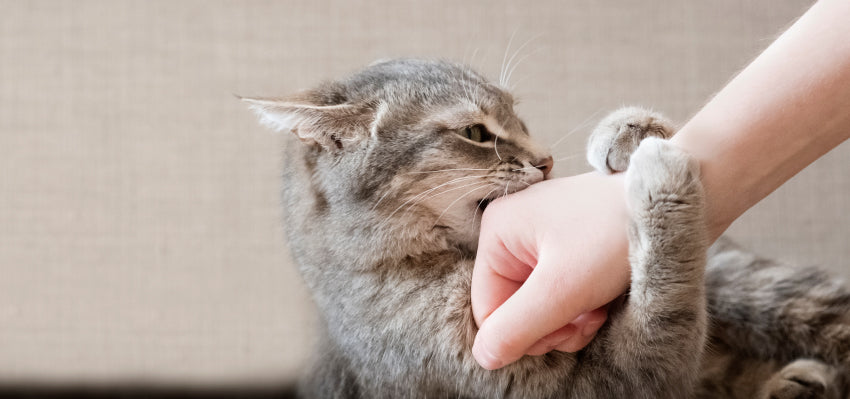
1. Affection
If your cat frequently "makes biscuits," then you know how they show affection. Did you know that your cat may also bite you to tell you they love you? These nibbles may not seem like a big issue, but cat teeth are very sharp and can easily break the surface of your skin.
When cat bites break the skin, they can be quite dangerous as a cat's mouth contains a significant amount of bacteria. This includes Pasteurella Multocida, Streptococcus, Bacteroides, Staphylococcus, Fusobacterium, and Porphyromonas. You can also get tetanus from a cat bite, necessitating the need to get a tetanus booster.
Instead, work to prevent bites from occurring.
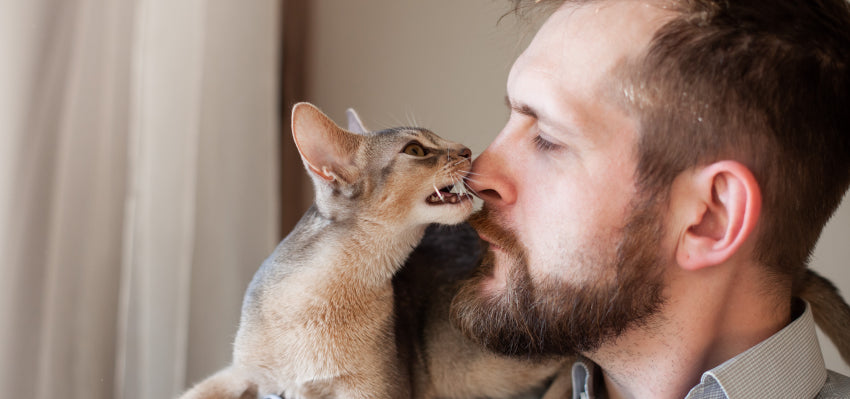
2. Anxiety
Why do cats bite you? The answer may be if they're afraid or anxious. If this is the case, they may bite you (or someone else).
Biting is a defense they resort to whenever something makes them feel threatened or backed into a corner. Consider if your cat has gone through changes lately that could cause anxiety-related biting.
It's important to know the signs of fear and anxiety in cats. This can help you avoid getting bitten. Pay close attention to your cat and look for the following warning signs of a scared, anxious feline:
- Hissing
- Meowing
- Crouching low to the ground
- Pupils dilated
- Hair on the back or tail raised
- Ears flattened out
If you notice these signs of fear and anxiety in your cat, give them plenty of space so they can overcome these emotional obstacles. Let them hide, if this makes them feel calm and relaxed.
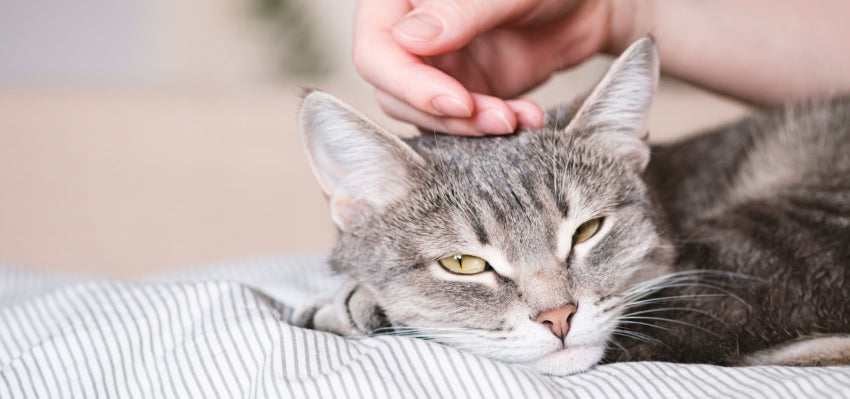
3. Petting
Another common question is, "Why does my cat bite me when I pet her?" Cats bite when you're relaxing and petting them. Cats have an innate survival skill, and petting can easily turn into biting.
When cuddling with or petting your fur baby, if you see their tail wave back and forth or they hiss or stiffen up, back off to avoid being bitten.
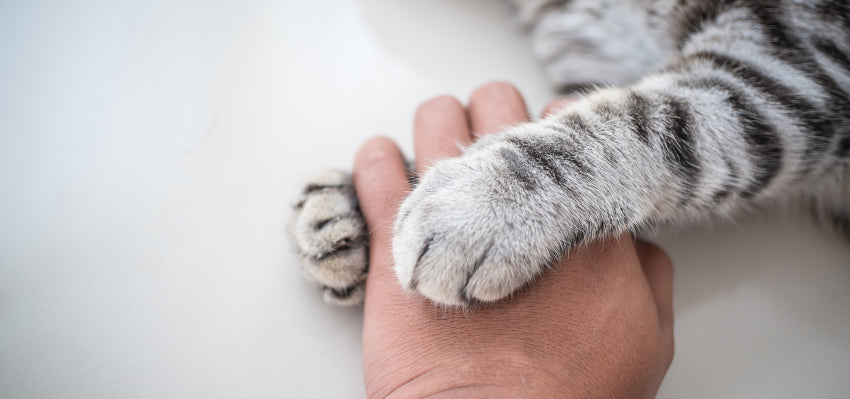
4. Attention
You may also be wondering, "Why does my cat bite me when I walk by?" Even though they act coy, many cats love attention.
However, this can lead to biting. Cats may also bite you if you're paying too much attention to them.
Pay close attention to what precipitates the biting. If you're sitting down and your cat suddenly runs over and bites you before running to a toy, they may want you to play with them. The same goes if your cat bites you and runs over to their food or treat dish, as they may be hungry.

5. Playing
Have you ever asked yourself, "Why does my cat randomly bite me when we're playing?" Not all cats know how to play appropriately. This is especially true for young cats.
Kittens usually like to play roughly with their humans, but this can turn aggressive. It's important to teach your kitten the best way to play appropriately, so always keep toys close by. Encourage your kitten to play with their toys, keeping your hands and feet far from their teeth (and claws!).
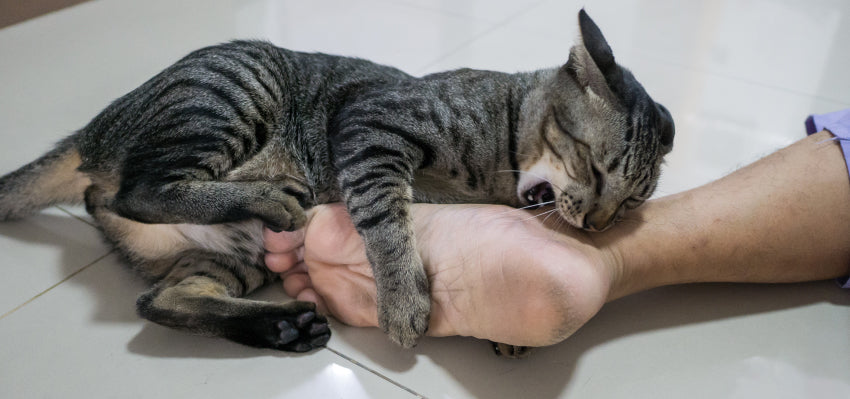
6. Territorial Biting
You may be thinking, "My cat hugs my arm and bites me," but not know why. This is something that cats do when hunting. But this isn't the only reason cats bite.
The reason your cat is biting may have nothing to do with you. It may have everything to do with a new animal in the home.
If you've recently adopted a new pet - especially a cat - your feline companion (or companions) may become territorial. Cats tend to feel this way if they suspect that an intruder has invaded their space.
One way cats assert themselves is by biting. They may also fight with the new animal. This is why you want to introduce the animals appropriately, helping both cats feel at ease.
Where do you begin? Let's take a look at how you can successfully introduce a new cat into your home.
6.1 Introducing a New Cat
You should always confine your new cat to a room. This helps them acclimate to your home and helps your other cat prepare for a new housemate. You want your new cat's room to have everything they need, from food and water to a bed, scratching post, and toys (to name a few).
After your new cat is comfortable in their new space, you want to swap scents between them and your other cat(s). You want them to familiarize themselves with each other's scents BEFORE meeting one another.
You can scent-swap by exchanging each cat's bedding with one another or by having them explore each other's space. Basically, they'll be exchanging rooms, staying separate at all times.
After your new cat is acclimated and you've swapped scents between cats or had them explore each other's spaces, you can let them see one another, but they should still be separated. You should separate them using a gate.
Once you've mastered this part of the introduction process and if your cats are still comfortable, you can allow them to formally meet one another, but don't leave them alone together. If one or both cats show signs of aggression, replace the barrier between them so they can only see each other. Then try again at a different time.
After this part of the process is completed and they're been able to successfully interact without a barrier, they can frequently spend time together. However, these interactions should be short (yes, you can leave them alone together). If you're more comfortable keeping an eye on them throughout this process, you can install a camera in the room to monitor their behavior.
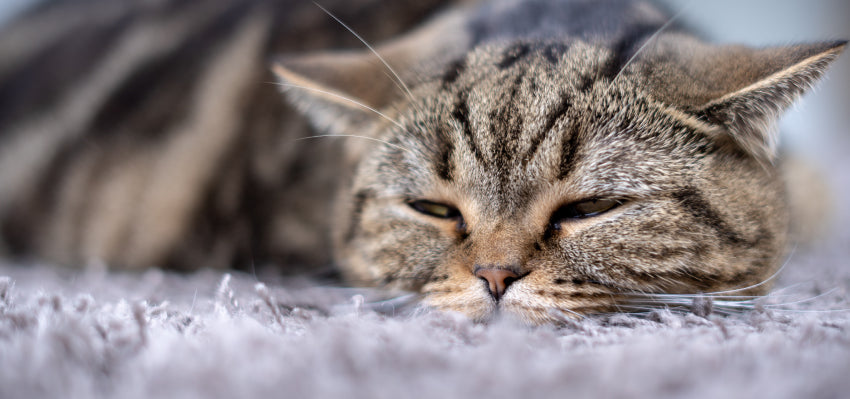
7. Pain or Illness
You should always have a veterinarian evaluate your cat to determine if pain or illness is the source of their biting. Cats are known for hiding their symptoms, so you may not know that they have something going on until they're in a significant amount of pain.
Your vet can run a myriad of diagnostic tests to see if something is bothering your feline friend. If, for example, your pet has arthritis, they may bite you in response to any pain they may be experiencing.

8. How to Stop Cats From Biting
Now that you understand several reasons why cats bite, it's important to learn how to stop them from biting. If your vet has successfully ruled out pain or an illness that might cause your pet to bite, you can work to train them on how to not bite.
Here's how you can break your cat's bad biting habit.
8.1 Understanding Their Body Language
As previously mentioned, your cat may exhibit warning signs when they're about to bite you. Knowing what these signs look like - and understanding them - can help you prevent a bite from happening.
Before you approach (or pet) your cat, look to see how they're reacting physically. A relaxed cat may be on their side, tummy exposed. If you notice that your cat looks tense or stiff, don't approach them or attempt to pet them.
8.2 Don't Startle or Scare Your Cat
Numerous things may scare your cat. If you have company over or there are loud noises, your cat may become frightened. This is also when they may bite.
Instead of approaching your cat when they're scared, you can let them come to you. When you grab a cat or reach for them unexpectedly, it can scare them. This is especially true for senior cats who may be hard of hearing or have limited sight.
8.3 Always Handle Your Cat Carefully
It's important to be mindful of the way you handle your cat. For example, you should never pick them up by the scruff of their neck. You should also use two hands to pick your cat up or ensure they're properly supported.
Cats may feel restricted in your arms or even nervous, so be mindful of how you hold them. Additionally, never swing your cat in the air.
Keep in mind that cats prefer being petted on the head and neck. The tail and belly areas are usually off-limits with cats. However, if your cat has shown you that they like being petted in these locations, you can continue to do so, unless they give you signs that they're about to bite.
Why don't cats like a good belly rub?
For starters, cats have hypersensitive hair follicles on their bellies and tail regions. When you pet them there, they tend to feel overstimulated and may bite in response to this sensation.
8.4 Get Your Cat Some Toys
When you play with your cat, always use toys. When you use your hands, you run the risk of a cat bite.
If your cat bites you and the puncture is deep, your doctor may preemptively recommend antibiotics. The same goes for any animal or human bite, especially if you don't know the animal's vaccine history. If this is the case, you may need a series of vaccines, including a rabies vaccine.
Instead, protect yourself from sharp teeth (and claws) by using toys when playing with your cats.
8.5 Don't Forget Rewards
Cats love a reward as much as the next animal, and what better way to reinforce good behavior than with their favorite treat? When playing with your cat, use treats to reward them for good behavior. However, if they bite you, refrain from giving them any treats when this occurs.
Remember that you only want to reward an aggressive cat with treats or playtime when they're relaxed.
8.6 Contact a Cat Behaviorist
There are trained professionals who specialize in cat behavior. They can help you with everything from cat biting to inappropriate elimination around your home. These professionals can work with you to understand you, your cat, and your relationship, working as a team to determine the source of your cat's behavior.
Since these specialized behaviorists go through an extensive period of training, they come prepared for each new situation, ready to offer you advice on how to correct your cat's biting behavior.
8.7 CBD Oil
If your cat is anxious or aggressive, you can give them CBD oil to help calm them. Bailey's CBD Oil for Cats may greatly improve the bond between you and your cat, helping them to feel their best.
Every animal has an endocannabinoid system. When they receive CBD in the form of cannabinoids, they'll experience regulation in their biological system.
This includes their mood, comfort, sleep, and how well they recover. Additionally, CBD can help to reduce inflammation in your cat, along with pain and possibly seizures.
If these are the reasons for your cat's biting aggression, CBD oil is a viable option. CBD oil can also help reduce anxiety and aggression in cats. Additionally, CBD helps appetitive and digestion, making it a viable option for a myriad of health issues in feline friends.
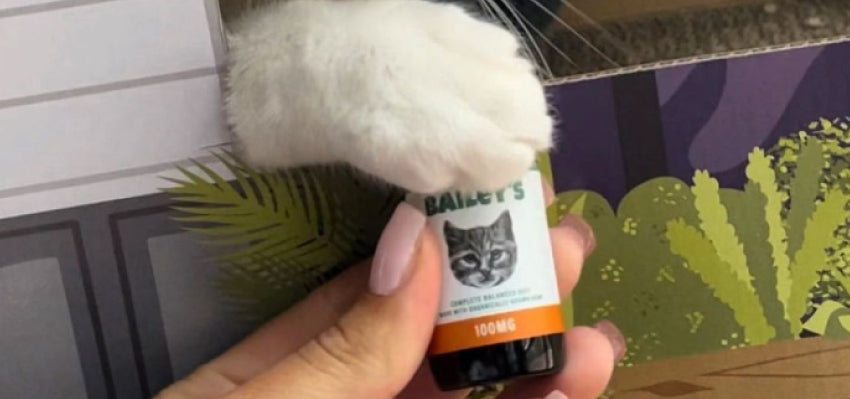
9. Why Does My Cat Bite Me?
Now that you understand the answer to the question, "Why does my cat bite me?", it's important to pay close attention to your cat's body language before approaching them, as this can avoid a potential bite. More importantly, you should always have your cat evaluated by a veterinarian to ensure that the source of their biting is in no way connected to pain or illness.
Remember that cats can mask their symptoms, so always have a professional check them out before regarding their symptoms as behavioral. As always, monitor children whenever they're around animals, even pets.
If you're looking for a solution to your cat's biting habit, Bailey's can help. Our CBD Oil for Cats is non-toxic and crafted of high-quality products. As with anything, always consult your veterinarian before giving your cat a new product.
We offer a variety of CBD items for pets, so contact us today with any questions you may have about how to stop a cat from biting with the use of CBD oil.
These products have not been evaluated by the FDA and are not intended to diagnose, treat, cure, or prevent any disease.











